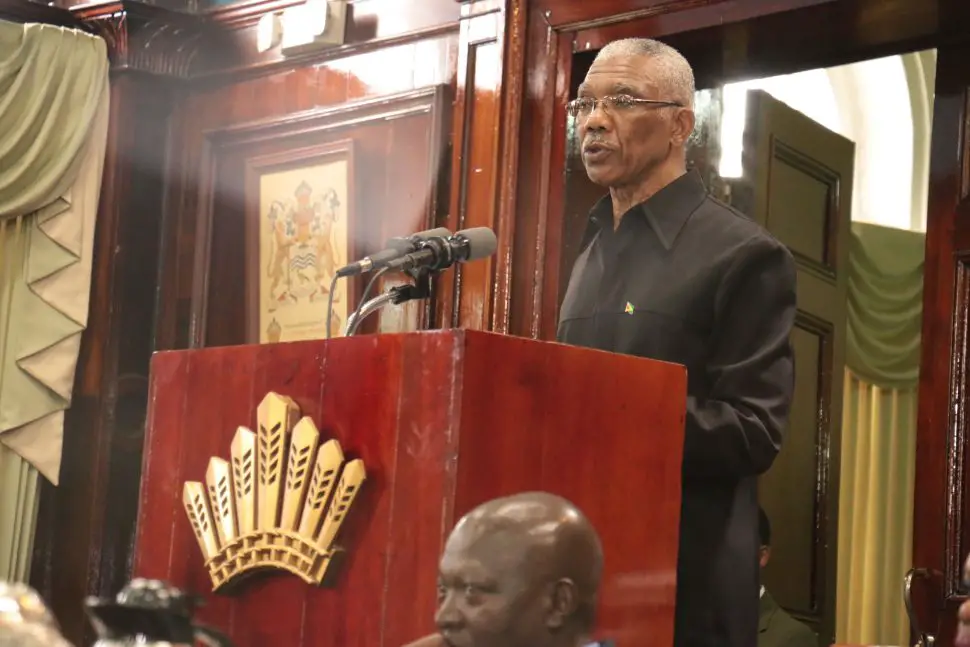
March 13 2019
The Ministry of the Presidency today said that President David Granger has written to the Guyana Elections Commission urging it to present a work programme in the shortest possible time to guide his proclamation of a date for general elections.
It is unclear what such a letter will achieve to break a deadlock at GECOM where the government-appointed commissioners are insisting on house-to-house registration, which can take elections all the way next year, while the opposition-appointed commissioners are insisting that April 30th this year be the outer day.
After March 21st, without an extension by Parliament for general elections to be held, the government would be considered to be illegal.
A release from the Ministry of the Presidency follows:
President calls on GECOM to submit work programme soonest
– programme vital to determine Commission’s readiness for elections
Georgetown, Guyana – (March 13, 2019) President David Granger, this morning, wrote to Chairman of the Guyana Elections Commission (GECOM) Justice (Ret’d) James Patterson requesting that the Commission presents him with a work programme in the shortest possible time.
In his missive to Justice Patterson, the President noted it is essential that he is informed of the Commission’s readiness to deliver credible elections in Guyana.
“I urge you to present your plans, programmes and financial needs which will guide my proclamation of a suitable date for elections,” the Head of State said in his correspondence to Justice Patterson.
Since the passage of the ‘no confidence motion’ against the Government, President Granger has twice consulted with Opposition Leader, Mr. Bharrat Jagdeo. He also consulted the Chairman and Commissioners of GECOM.
The Head of State has emphasised that the Government of Guyana will not interfere or intrude in the work of the Commission.
Last week, the President invited the Commission to a meeting to discuss issues related to the hosting of General and Regional Elections this year.
“Let me make one thing clear. The Government is in no way interfering or intruding in the constitutional role and duty of the Commission. It is for the Commission to advise me that it is ready and I will then proclaim a date. Naturally, I will like to proclaim a date that is sanctioned by the National Assembly and the Constitution, but we have not intruded in the work of the Commission and we are prepared to support the Commission in what it has been doing. It is not for me to overrule the Commission,” President Granger said in a statement following the meeting.
He maintained that “the Commission is independent. It is not for anybody to give the Commission instructions as to when elections are to be held. Once the Commission says it is ready, I will announce a date and I hope that date is as early as possible.”
Article 62 of the Constitution of Guyana states that “Elections shall be independently supervised by the Election [s] Commission in accordance with the provisions of Article 162.”
Article 161 A (1) says “the Elections Commission shall be responsible for the efficient functioning of the Secretariat of the Commission, which shall comprise the officers and employees of the Commission, and for the appointment of all the staff to the offices thereof inclusive of all temporary staff, recruited for the purposes of boundary demarcation, registration or persons and elections and shall have the power to remove and exercise disciplinary control over such staff.”
Article 161 (B) makes the role of the political parties and their nominees in the conduct of elections by the Elections Commission clear. It says that “the role of political parties and their nominees in the conduct of elections by the Elections Commission shall be limited to their participation in determining policy, monitoring the electoral process and the conduct of the election, but does not include active management of the electoral process”.
Moreover, Article 162 (1) of the Constitution speaks to the Commission having functions connected with or relating to the registration of electors or the conduct of elections as are conferred upon it by or under the Constitution, or subject to any Act of Parliament, and to the provisions of the Constitution, the Commission “shall exercise general direction and supervision over the registration of electors and the administrative conduct of all elections of members of the National Assembly and shall issue such instructions and take such action as appear to it necessary or expedient to ensure impartiality, fairness and compliance with the provisions of this Constitution or any Act of Parliament on the part of persons exercising powers or performing duties connected with or relating to the matters aforesaid.”


